What Is Self-Sabotage? How to Help Stop the Vicious Cycle
 What was your New Year’s resolution?
What was your New Year’s resolution?
Are you still working on it, or has it been abandoned with a mental note to try again next year?
Since Babylonian times, humans have embarked on New Year’s resolutions with hope and determination to improve their lives in the upcoming year. Every year, by the beginning of February, approximately 80% of new goals have been abandoned (Luciani, 2015). New Year’s resolutions are disrupted in a myriad of ways, and one of the most prevalent is self-sabotage.
A sabotaged resolution can seem benign, all things considered; however, chronic self-sabotage can lead to destructive outcomes in our personal and professional lives.
Self-sabotage is more prevalent than we realize. Abraham Lincoln, Fred Rogers, Michelangelo, John F. Kennedy, and George Washington all experienced some aspect of self-sabotage before they made history (Leadem, 2017).
What is self-sabotage, and how does it undermine millions each year?
Before you continue, we thought you might like to download our three Self-Compassion Exercises for free. These detailed, science-based exercises will not only help you increase the compassion and kindness you show yourself, but also give you the tools to help your clients, students, or employees show more compassion to themselves and stop destructive behavior.
This Article Contains:
- Self-Sabotage: A Psychological Definition
- Why Do We Self-Sabotage? 5 Possible Causes
- Its Link to Fear of Failure and Fear of Success
- A Look Into Self-Sabotage in Relationships and Work
- How to Stop Self-Sabotaging: 8 Practical Tips
- Addressing Self-Sabotage in Therapy Sessions
- Books on the Topic
- 3 Interesting Podcasts
- PositivePsychology.com’s Relevant Resources
- A Take-Home Message
- References
Self-Sabotage: A Psychological Definition
Self-sabotage occurs when we destroy ourselves physically, mentally, or emotionally or deliberately hinder our own success and wellbeing by undermining personal goals and values (Brenner, 2019). It is “insidious, profound, and universal” and emanates from negative mindsets (Berg, 2015).
Self-sabotage, also known as behavioral dysregulation, can be conscious or unconscious depending on level of awareness. An example of conscious self-sabotage is deciding to eat cake, despite a goal to eat healthy. Unconscious self-sabotage happens when a personal goal or value has been undermined but not initially recognized.
Someone with a fear of failure might wait until the last minute to work on an important project, unconsciously avoiding the prospect of advancement (Wignall, 2020).
Another dimension of self-sabotage is cognitive dissonance. Cognitive dissonance is the internal imbalance or discomfort experienced when words or actions do not align with beliefs and values. When this happens, we act to ease the discomfort by changing our words or behaviors or by reframing our goals and values.
It seems unlikely that anyone would intentionally sabotage themselves, yet they do, and the consequences can be caustic. Chronic self-sabotage depletes drive and motivation and leaves us sad, anxious, and with damaged self-esteem.
This video from psych2go.net introduces seven common signs of self-sabotage, how it impacts our daily lives, and how to discern if we need help.
24 Self-sabotage behaviors
People from all walks of life sabotage themselves by letting negative thoughts spiral out of control, and this is just the tip of the proverbial iceberg (Berg, 2015).
Self-sabotage is rooted in counterproductive mindsets including negativity, disorganization, indecisiveness, and negative self-talk. Perfectionism and imposter syndrome are also forms of self-sabotage. An insidious and ubiquitous form of self-sabotage is mindless distractions that prohibit goal attainment.
Some mindless distractions include binge watching TV, surfing the internet, scrolling through social media, video game obsession, and internet shopping.
Besides counterproductive mindsets, we engage in counterproductive or destructive behaviors. Some common behaviors include overeating, excessive drinking or drug abuse, pornography, smoking, gambling, self-injury, and overspending.
Avoiding behaviors keep us stuck in negative and self-destructive cycles. Common avoiding behaviors include procrastination, chronic tardiness, giving up when things get rough, and lack of assertiveness.
Rational fears are essential for safety and perpetuation. However, when fears become imbalanced, they hold us back from progress in careers and personal life. Some common ungrounded fears include fearing commitment, the unknown, change, failure, and losing control.
Why Do We Self-Sabotage? 5 Possible Causes
No one intentionally decides to self-sabotage, despite the temptation of chocolate cake while on a diet. Why then do we sometimes chronically execute these destructive behaviors?
Research reveals these possible reasons:
1. Approach–avoidance conflict
Dr. Judy Ho, author of Stop Self-Sabotage (2019), describes self-sabotage as a biological response, once necessary for survival. She uses Kurt Lewin’s approach–avoidance conflict to explain goals that have both positive and negative aspects, creating competing forces.
The approach dynamic is initiated by setting goals, which releases dopamine. The avoidance dynamic is initiated by avoiding a threat, including physical and psychological threats or perceived threats such as change. Self-sabotage occurs when the desire to reduce threats exceeds the drive to reach goals (Ho, 2019).
This video created by the Academy of Ideas illustrates the concept:
2. Modeling
Self-sabotaging behaviors can emanate from childhood models and patterns, including a parent who lacked confidence to succeed. The parent who consistently warns a child to be careful at the playground may cause the child to internalize the world as unsafe and exploration to be avoided.
3. Rejection or neglect
Being rejected or neglected by a parent can cause low self-esteem and other negative self-image issues. This can compel us to sabotage personal relationships in an effort to avoid further vulnerability and rejection.
4. Adaptive to maladaptive behaviors
We adopt behaviors that are initially considered adaptive for surviving challenges; however, behaviors can become maladaptive when they continue long after the challenge has passed.
5. Trauma
A child who is violated by any person, particularly a person of trust, may look at the world as unsafe and view themselves as undeserving of good things in life, leading to self-sabotage.
Its Link to Fear of Failure and Fear of Success

Insecurity originates from the inner critic that tells us we can’t accomplish a certain task or aren’t good enough (Jacobsen, 2016).
These remnants of the past deplete our self-confidence and compel us to create dysfunctional habits that serve to protect us from the pain of failure. Sabotage also protects our inner self that secretly fears becoming powerful; power will change the world as we know it and, therefore, represents a threat (Rippo, 2016).
If self-sabotage is detrimental, why repeat it? Simply put, what gets rewarded gets repeated. Sabotage fills a need or void of some kind. To stop the cycle of destructive behavior, we need to discover the void and learn new behaviors.
According to Chamine (2012), your positive intelligence (PQ) is the percentage of time your mind is spent serving you versus sabotaging you, allowing you to flourish or be overrun by negative, rigid behaviors.
Chamine (2012) identifies ten saboteurs or voices in our heads that generate negative emotions and negatively influence how we handle life’s challenges. These saboteurs represent automatic patterns in thinking, feeling, and behaving. They promote stress, anxiety, frustration, unhappiness, and self-doubt. As a result, they significantly affect our wellbeing and can make us feel as though we are self-sabotaging.
Critically, not everyone is affected by all ten of the saboteurs simultaneously and in the same way. Different people are affected by different types of saboteurs. The judge is the universal master of all people and a common saboteur that afflicts all individuals.
The good news is that saboteurs are not static or fixed for life. They can be changed and weakened by boosting our minds’ age or positive muscles.
A Look Into Self-Sabotage in Relationships and Work
Two prominent areas where self-sabotage can be revealed, is in relationships and in the workplace.
Self-sabotage in relationships
Reasons for sabotaging relationships are complex, but understanding the origins of sabotage is key for change.
Sabotage in relationships occurs in various forms, including choosing partners who are incompatible, picking fights, and refusing to fully commit to relationships.
Other signs include unrealistic expectations, chronic mistrust, silencing the self, and losing yourself in the relationship. Cognitive-Behavioral Therapy is an effective strategy for dealing with relationship issues (Williams, 2017).
Mary Retta (2020) adds the following behaviors as other examples of signs of relational sabotage:
- Ignoring negative emotions
- Criticizing your partner
- Holding grudges
- Directing energy at things other than the relationship
- Focusing on your partner’s flaws
She suggests healing the past and working on a healthy self-concept, and adds helpful tips such as understanding attachment styles and engaging in open, honest communication with your partner (Retta, 2020).
Self-sabotage in work
Career sabotage includes:
- Disorganization
- Indecisiveness
- Perfectionism
- Procrastination
- Imposter syndrome
Kristin Boss (2020), mindset and business coach, discusses perfectionism, productive procrastination, and the over-researcher in her podcast Purposeful Social Selling.
As a researcher myself, her over-research concept intrigued me. This person is stuck in an over-learning or research cycle. Boss believes the over-researcher is on a quest for clarity, which provides a false sense of confidence and results in a failure to launch. To counteract this cycle, she recommends doing just enough research to take the next step.
Boss implores saboteurs to realize it’s okay to fail.
For more on this, listen to episode 3 of Kristin Boss’s (2020) Purposeful Social Selling podcast. In this specific episode, Boss discusses how professionals perseverate in seemingly productive areas as a way to postpone the vulnerability of commitment and possibility of failure.
On a related topic, we discuss positive intelligence and how to overcome saboteurs.
How to Stop Self-Sabotaging: 8 Practical Tips
The origins of self-sabotage are rooted in emotional experiences, often from childhood, that affect our self-perception. Author and coach Maria Rippo (2016) believes that healing shame from childhood can release us from this cycle. The journey is about discovering the origins of powerlessness that choreograph our toxic thoughts.
The ability to recognize triggering thoughts is an essential first step for transforming self-sabotage patterns. Self-awareness initiates the introspection process and will help identify toxic thoughts and their origins. These triggers are often accompanied by an intense or atypical emotional reaction. Watch this video to become more aware of your emotions.
Once you are aware of toxic thoughts, there are several ways to transform or deactivate them. Positive self-talk, analyzing and testing thoughts to discern legitimacy, and modifying them are just a couple of ideas.
Cognitive defusion also helps by creating distance between the person and the problem and can be achieved through distanced self-talk and journaling.
Additionally, here is a video guiding you through 30 days of journaling and discussing the science and benefits of journaling:
Once the triggers of self-sabotage are addressed, the goal is to extinguish negative behaviors. Self-regulation helps moderate strong emotions and regain command of behavior. Ho (2019) suggests acting contrary to our feelings.
This worksheet is a step-by-step guide to help extinguish self-sabotaging behaviors.
A less popular idea is to get acquainted with uncomfortable feelings such as failure, rejection, and disappointment. Luvvie Ajayi Jones provides this excellent TED Talk to encourage us to speak up.
The Practicing Radical Acceptance exercise helps clients practice acceptance of painful physical or emotional circumstances.
Embarking on your journey with self-compassion can provide further insight into historical patterns and personal needs. Renowned specialist Kristin Neff provides this great self-compassion talk:
The Letter of Self-Compassion exercise invites clients to write themselves a brief message of forgiveness and acceptance in the second-person perspective to help pave the way for self-forgiveness and compassion. Such a practice can support smoother navigation through hard times using clarity, kindness, and forgiveness.
Finally, there are several effective therapeutic interventions for working through ambivalence and damaging mindsets. If self-sabotage is negatively affecting daily life, consider seeing a professional.
Addressing Self-Sabotage in Therapy Sessions
There is not one specific way to address self-sabotage in therapy sessions, according to Dr. Lindsay Barlow (personal communication, April 2020), a clinical psychologist at the Huntsman Mental Health Institute. Barlow indicates that when clients are struggling with issues regarding success or growth, it can point to their underlying core beliefs. Motivational interviewing can help them resolve ambivalence.
A method that Barlow believes works well with teenagers to change core beliefs is Linehan’s Dialectical Behavior Therapy, in which the client views a destructive self-concept from a joyfully irreverent perspective.
In addition, components of Acceptance and Commitment Therapy can help clients change their relationship with unproductive thoughts. The sillier or more outrageous the approach, the better it works. Ideas such as singing the thought, saying it with a funny accent, or writing it in crazy bubble letters are encouraged. Changing the relationship with the thought paves the path to eventually letting it go.
Books on the Topic
Below are four great reads to help a person stop sabotaging themselves.
1. Stop Self-Sabotage: Six Steps to Unlock Your True Motivation, Harness Your Willpower, and Get Out of Your Own Way – Judy Ho
Dr. Judy Ho takes a full spectrum analysis of self-sabotage in order to answer why we do it and how to stop.
She uses therapeutically proven strategies, practical tools, and self-assessments to show how to identify triggers, modify thoughts, and change behaviors.
Find the book on Amazon.
2. Your Self-Sabotage Survival Guide: How to Go From Why Me? to Why Not? – Karen Berg
Motivational expert Karen Berg encourages readers to transcend the ordinary and become extraordinary using a firm, tough-love program to help you get what you want.
Your Self-Sabotage Survival Guide will help you refocus your energy, get back on track, and eliminate sabotage from your life.
Find the book on Amazon.
3. Chatter: The Voice in Our Head, Why It Matters, and How to Harness It – Ethan Kross
Some of the most important conversations we have are with ourselves.
Ethan Kross examines the voice in our head, explains why it’s there, and reveals how we can learn to harness it rather than allowing it to destroy us.
This book explains the internal process of self-talk in plain and understandable language. It is a revealing perception of human nature.
Find the book on Amazon.
4. Opening Up by Writing It Down: How Expressive Writing Improves Health and Eases Emotional Pain – James W. Pennebaker and Joshua M. Smyth
It is universally difficult to express painful emotions.
Pennebaker and Smyth demonstrate how expressive writing is a valuable way to express painful emotions in a way that can improve our mental and physical health and heal old wounds.
The authors show how this self-help technique is grounded in scientific research and when the approach may not be helpful.
Find the book on Amazon.
3 Interesting Podcasts
Sadly, self-sabotage is becoming so prominent that we found not one but three podcasts dedicated to overcoming self-sabotage.
1. Purposeful Social Selling, Episode 3. Sneaky Types of Self-Sabotage
Kristen Boss, a mindset and business coach, specializes in teaching marketing and mindset in the online world.
She teaches practical tips, strategies, and real truths for entrepreneurs looking to excel while serving with a purpose.
2. Crappy to Happy Podcast
This podcast is for people who are struggling with low energy, mood, or motivation and aren’t sure why. It provides solutions and ideas to help listeners reach peak performance.
Holistic psychologists Nicole LePera and Cass Dunn weigh in with practical and meaningful ways to make changes and feel happier, more energetic, and more confident.
3. The Self-Sabotage to Success Podcast
Lucy Orton, a certified positive psychology coach, provides mindset insights, truth bombs, and confidence-boosting tips for purpose-led business owners.
This podcast is for ex-corporate entrepreneurs learning to transform into confident, empowered business owners.
PositivePsychology.com’s Relevant Resources
For even more resources to help clients overcome self-sabotaging tendencies, check out some of the following:
- Reward Replacement Worksheet
This worksheet helps clients identify the negative consequences of behaviors they use to reward themselves and select different reward behaviors with positive consequences to replace them. - Self-Directed Speech Worksheet
This worksheet helps clients motivate lasting behavior change by mobilizing their inner voice to encourage themselves during challenging moments. - My Positive Qualities
This worksheet invites a group of participants to recognize and explore positive personal qualities using twelve different fill-in-the-blank statements. - Dispute Negative Thinking
This activity helps clients gain some distance from their inner critic by inviting them to write common self-critical thoughts on cards and practice quickly disputing them.
If you’re looking for more science-based ways to help others develop self-compassion, this collection contains 17 validated self-compassion tools for practitioners. Use them to help others create a kinder and more nurturing relationship with the self.
A Take-Home Message
At some point, Abraham Lincoln, Fred Rogers, Michelangelo, John F. Kennedy, and George Washington all realized that self-defeating behaviors reside in the 18 inches between their head and their heart and found ways to move past the issues that plagued them (Leadem, 2017).
All of them went on to make history.
We can do the same.
Each of us can move past counterproductive behaviors. Although our behavior is not always our fault, it is our responsibility.
Consider using the tools provided here to guide your process. Go ahead and reinvest in that New Year’s resolution or any other goal that’s been hovering close, refusing to leave.
Take it slow and make it reasonable. Take baby steps when necessary.
Don’t focus on missteps, and remember to celebrate your successes.
Finally, take comfort in the fact that historical legends began as ordinary people who grappled with personal struggles, persevered, and made a difference.
We hope you enjoyed reading this article. Don’t forget to download our three Self-Compassion Exercises for free.
- Berg, K. (2015). Your self-sabotage survival guide: How to go from why me? to why not? Career Press.
- Boss, K. (2020). Sneaky types of self-sabotage. Purposeful Social Selling [podcast].
- Chamine, S. (2012). Positive Intelligence: Why Only 20% of Teams and Individuals Achieve Their True Potential and how You Can Achieve Yours. Greenleaf Book Group.
- Brenner, B. P. (2019, June 19). Stop sabotaging yourself: Tips for getting out of your own way. Therapy Group of NYC. Retrieved March 13, 2021, from https://nyctherapy.com/therapists-nyc-blog/stop-sabotaging-yourself-tips-for-getting-out-of-your-own-way/
- Ho, J. P. (2019). Stop self-sabotage: Six steps to unlock your true motivation, harness your willpower, and get out of your own way. Harper Wave.
- Jacobsen, S. (2016, May 10). Self-sabotage: What it looks like and why you do it. Harley Therapy Counseling Blog. Retrieved March 13, 2021, from https://www.harleytherapy.co.uk/counselling/self-sabotage.htm
- Kross, E. (2021). Chatter: The voice in our head, why it matters, and how to harness it. Vermilion.
- Leadem, R. (2017, November 9). These artists, authors and leaders battled self-doubt before they made history. Entrepreneur. Retrieved from https://www.entrepreneur.com/slideshow/304340
- Luciani, J. (2015, December 29). Why 80 percent of New Year’s resolutions fail. U.S. News & World Report. Retrieved from https://health.usnews.com/health-news/blogs/eat-run/articles/2015-12-29/why-80-percent-of-new-years-resolutions-fail
- Pennebaker, J. W., & Smyth, J. M. (2016). Opening up by writing it down: How expressive writing improves health and eases emotional pain (3rd ed.). Guilford Press.
- Retta, M. (2020, January 28). Why you’re self-sabotaging your relationships & 4 ways to stop. mindbodygreen. Retrieved March 16, 2021 from https://www.mindbodygreen.com/0-18791/why-we-sabotage-relationships-with-people-who-treat-us-well.html
- Rippo, M. (2016). Minding the mind/body connection in moving beyond self-sabotage and resistance to change. Journal of Heart-Centered Therapies, 19(2), 39–62.
- Wignall, N. (2020, June 7). Self-sabotage: Why you do it and how to stop for good. Nickwignall.com. Retrieved March 4, 2021, from https://nickwignall.com/self-sabotage/
- Williams, D. M. (2017, November 15). Relationship sabotage: Putting an end to the cycle. Everyday Health. Retrieved March 22, 2021, from https://www.everydayhealth.com/emotional-health/relationship-sabotage-putting-end-cycle/
Let us know your thoughts
Read other articles by their category
- Body & Brain (49)
- Coaching & Application (57)
- Compassion (26)
- Counseling (51)
- Emotional Intelligence (24)
- Gratitude (18)
- Grief & Bereavement (21)
- Happiness & SWB (40)
- Meaning & Values (26)
- Meditation (20)
- Mindfulness (45)
- Motivation & Goals (45)
- Optimism & Mindset (34)
- Positive CBT (28)
- Positive Communication (20)
- Positive Education (47)
- Positive Emotions (32)
- Positive Leadership (18)
- Positive Parenting (4)
- Positive Psychology (33)
- Positive Workplace (37)
- Productivity (16)
- Relationships (46)
- Resilience & Coping (36)
- Self Awareness (21)
- Self Esteem (38)
- Strengths & Virtues (32)
- Stress & Burnout Prevention (34)
- Theory & Books (46)
- Therapy Exercises (37)
- Types of Therapy (64)

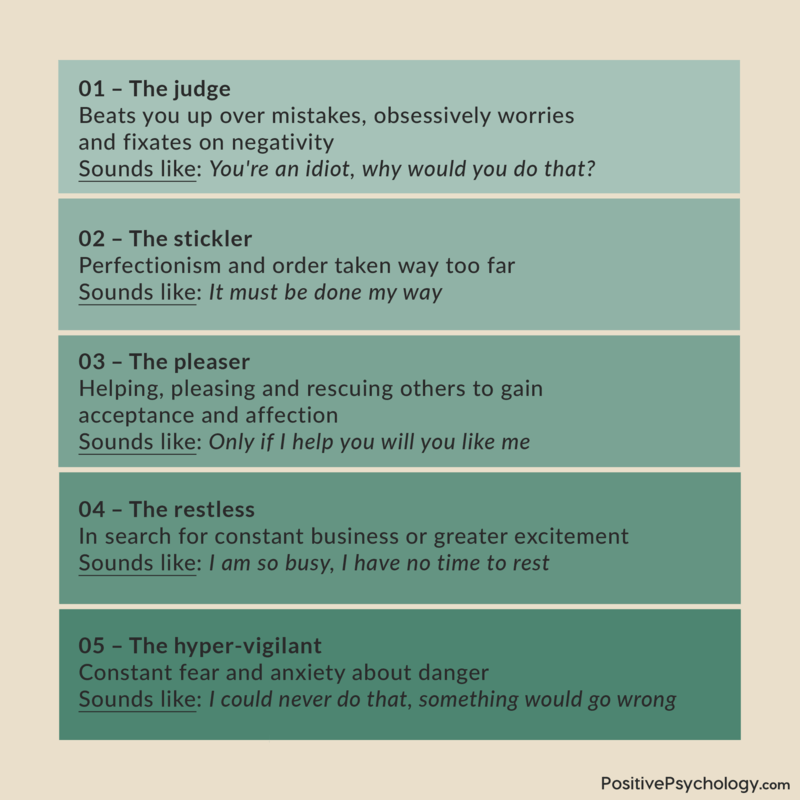
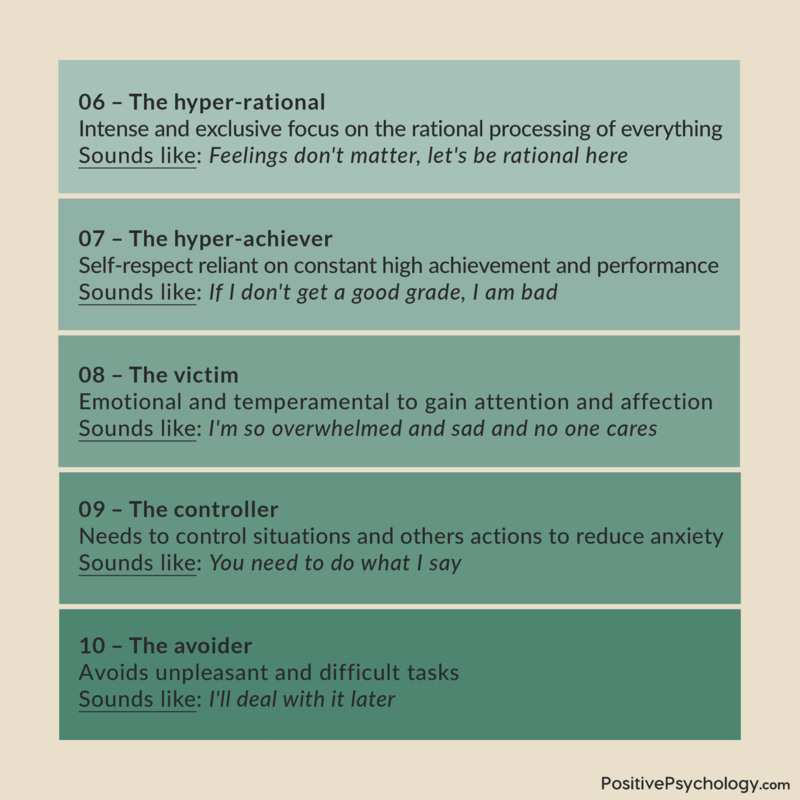


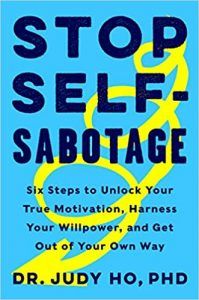
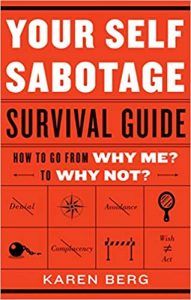


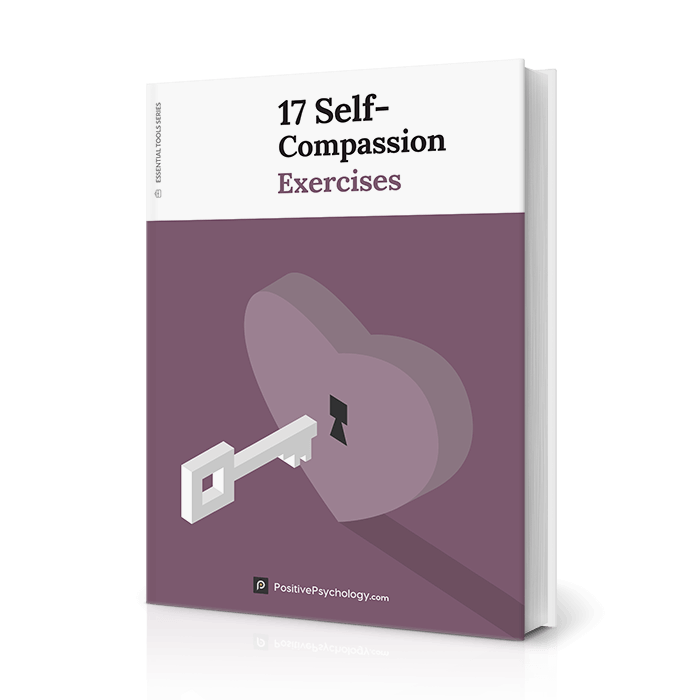



What our readers think
I believe one of my kids is struggling with self-sabotage. After reading this article and one more, plus the TED talk. I believe I have the necessary tool to start a meaningful conversation about it with my son and, hopefully, it will be a constructive discussion and he will go to a psychologist, look for help and be happy. My son is 22 years old…
love these worksheets!! xx
I realize how I have been self-sabotaging since I was a child and will be 51 in a month. Whether it’s relationships with friends, family or boyfriends, It almost feels like a bad habit I have been hanging onto for way too long and it is time to break it and change for the better and be more positive. Over the past 26 years, I have taken a lot of courses to help with work or self-improvement, in person and online and continue to learn and grow. One thing I learned from courses or programs is what to hold onto and what to let go of or save for another time in the future. Loving, respecting and forgiving myself before anything else is the key. I hope this helps others who may read this. God bless.
Thank you for “voicing” what I have been doing to myself too, since I was a child. I will be turning 51 this year, and like you, I have come a long way into knowing, accepting, and embracing myself for who I am (self-love, self-improvement, self-checking, self-healing). I hope to be embarking on this journey of breaking the habit of self-sabotage, a day at a time, and wishing you well in your journey.